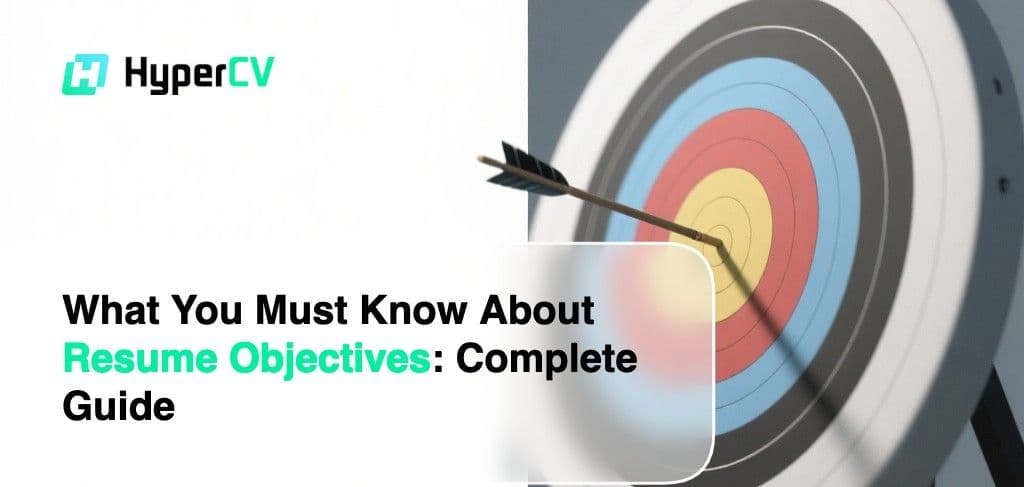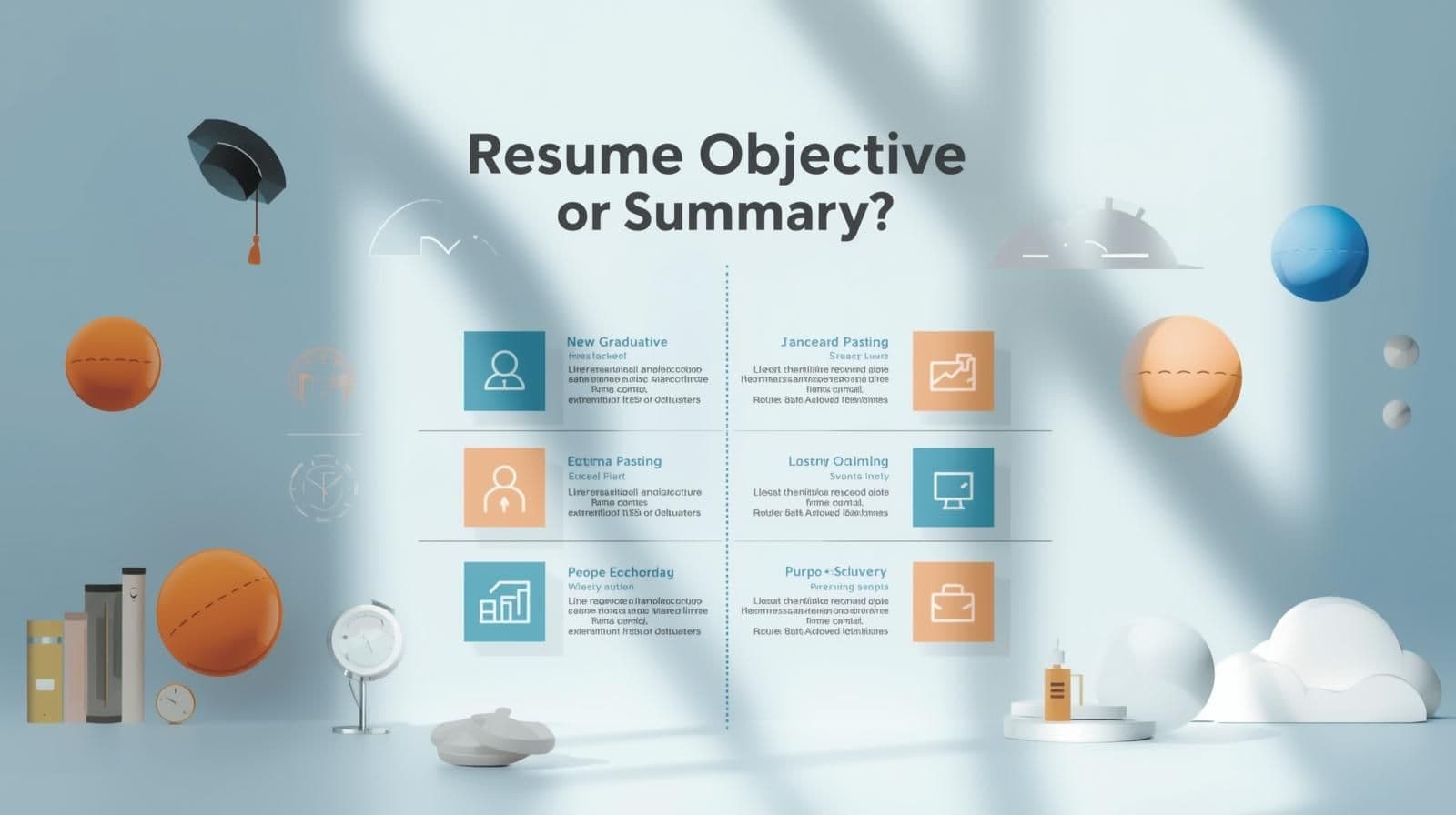What You Must Know About Resume Objectives: Your Complete Guide

Are you asking yourself whether you need a resume objective? This question comes up a lot in today's job market.
Resume objectives have changed over the years. They're not as popular as they once were, but they still have their place. When done right, they can grab attention and make you stand out.
This guide will show you everything about resume objectives. You'll learn what they are, when they work best, and how to write one that gets results. We'll also share real examples that you can use as inspiration.
Understanding Resume Objectives
A resume objective is a brief statement that appears at the top of your resume. It tells employers who you are, what job you want, and what skills you offer.
Think of it as your elevator pitch. In just a few sentences, you give recruiters a quick look at your career goals and value.
Resume objectives work well for certain job seekers. According to Indeed's career advice experts, they're especially useful for new graduates or people switching careers who need to help hiring managers understand how their career plans align with the job opening.
Here are two quick examples:
New Graduate Example: "Marketing graduate with strong SEO and data analysis skills seeking a digital marketing role at a growing tech company."
Career Changer Example: "Former retail manager moving into human resources, bringing five years of team leadership and customer service experience to support employee development."
Resume Objective vs Resume Summary: Key Differences
Both resume objectives and summaries go at the top of your resume. But they serve different purposes. As experts at Coursera explain, resume objectives look forward and resume summaries look back. For detailed examples and guidance on crafting effective summaries, see our comprehensive resume summary guide.
As experts at Coursera explain, resume objectives look forward and resume summaries look back. Here's what this means:
- Objectives talk about your career goals and what you want to achieve
- Summaries highlight your past work and accomplishments
If you have solid work experience, a summary usually works better. It lets you show off your biggest wins and proven results.
But if you're just starting out or changing fields, an objective helps explain your direction and goals.
You can also combine both approaches. Write a summary that includes your objectives for the best of both worlds.
When Resume Objectives Make Sense
Resume objectives aren't right for everyone. Sometimes they can actually hurt your chances.
That's because objectives focus on what you want from the job. Employers care more about what you can do for them.
If you have years of experience in your field, skip the objective. Use a resume summary instead to showcase your track record.
Best Times to Use Resume Objectives
Here's when resume objectives work well:
Starting Your Career New workers can use objectives to highlight their education, interests, and excitement for entry-level roles.
Switching Careers Career changers can explain their move and show how their skills transfer to the new field. Career transition experts at Indeed suggest highlighting transferable soft skills like teamwork, attention to detail, and eagerness to learn. When switching careers, it's also crucial to understand the key differences between cover letters and resumes to tell your transition story effectively across both documents.
Focusing on a Specialty If you have specific expertise in a broad field, your objective can make this clear right away.
Moving to a New Location When your work history is from another city or country, an objective shows you're serious about relocating.
Coming Back to Work After time away for family, travel, or health reasons, an objective can address the gap and show you're ready to work.
Writing an Effective Resume Objective
You have seconds to catch a recruiter's eye. Your resume objective needs to be clear, focused, and relevant.
Use this simple formula:
Resume Objective = Your Background + Target Role + Value You Bring
- Your Background: Current role, experience level, or education
- Target Role: The specific job you want
- Value You Bring: Key skills or strengths that help the employer
Here's how it looks in practice:
"Computer science graduate seeking a software developer position at TechCorp. Strong in Python and JavaScript with experience building web apps and solving complex coding challenges."
This example targets a specific company, includes relevant keywords, and connects the person's skills to what the employer needs.
Seven Tips for Better Resume Objectives
1. Keep It Short and Clear
Aim for one to two sentences. Get to the point quickly and avoid repeating information from other parts of your resume.
2. Be Specific About the Job
Mention the exact job title and tailor your objective to the company or industry. This shows you're not using the same resume everywhere.
3. Show Your Value
Don't just talk about your goals. Explain how you'll help the company succeed. Look at the job posting to understand what they need, then match your strengths to those needs.
4. Highlight Your Best Qualities
Pick one or two standout strengths. This could be relevant skills, certifications, or targeted experience that directly supports your ability to do the job.
5. Use Keywords from the Job Posting
Many companies use computer systems to screen resumes. Include key terms from the job description, especially the job title.
Research shows that resumes with the exact job title are 10.6 times more likely to get interviews.
6. Avoid Generic Language
Words like "hardworking" or "results-driven" don't mean much on their own. Be specific about your strengths. Mention tools you know, industries you've worked in, or problems you solve well.
7. Customize for Each Application
Generic objectives are easy to spot and ignore. Use keywords from each job posting and focus on how your background fits that specific role. Professional resume writers like those at NovoResume recommend emphasizing adaptability and relevant skills for career changers.

Resume Objective Examples by Situation
Entry-Level Position
"Psychology graduate with strong research and communication skills seeking an entry-level human resources role to support talent development and employee engagement."
Why it works: Shows educational background, highlights relevant soft skills, and connects to the target role.
Internship Application
"Business student focusing on marketing analytics, seeking a summer internship at a data-driven company to apply knowledge of consumer behavior and data tools like Tableau."
Why it works: Links academic work to real business needs, shows initiative, and mentions specific tools.
Career Change
"Elementary teacher with six years of curriculum development experience transitioning to corporate training, bringing classroom management skills and passion for adult learning to instructional design."
Why it works: Explains the career shift, emphasizes transferable skills, and shows how past experience adds value.
Returning to Work
"Administrative professional returning to work after family leave, eager to apply strong organizational skills, project management experience, and customer service expertise to support a dynamic team."
Why it works: Briefly addresses the work gap, highlights relevant skills, and shows enthusiasm for teamwork.
Relocation
"Project coordinator moving to Austin and seeking a construction management role. Brings four years of experience in site planning, vendor relations, and safety compliance for commercial projects."
Why it works: Explains the job search reason, shows commitment to the new location, and highlights relevant experience.
Industry-Specific Resume Objective Examples
| Industry | Example Objective |
|---|---|
| Accounting | "CPA candidate with three years of bookkeeping experience seeking a staff accountant role at a growing firm to apply financial reporting skills and attention to detail." |
| Technology | "Software engineer with five years in Java and Python development seeking a senior role at an innovative startup to build scalable applications and mentor junior developers." |
| Healthcare | "Registered nurse with critical care experience seeking a nurse educator position to share evidence-based practices and support new graduate development." |
| Sales | "Sales professional with eight years in pharmaceutical industry seeking a manager role to lead high-performing teams and drive revenue growth in competitive markets." |
| Education | "ESL instructor with multicultural classroom experience seeking a curriculum developer role to create engaging materials that support diverse learners." |
Common Resume Objective Mistakes to Avoid
Being Too Vague Avoid statements like "seeking a challenging position." Be specific about the role and industry you want.
Focusing Only on Yourself Don't just talk about what you want. Show how you'll benefit the employer.
Using Outdated Language Skip phrases like "seeking to utilize my skills." Use modern, direct language instead.
Making It Too Long Keep your objective to two sentences maximum. Longer statements lose impact and take up valuable space.
Forgetting Keywords Without relevant keywords, your resume might not get past computer screening systems. For more guidance on creating ATS-friendly resumes, check out comprehensive resources that provide updated examples for 2025.

Should You Use a Resume Objective in 2025?
The answer depends on your situation. If you have solid work experience in your field, a resume summary usually works better. It shows your accomplishments and proven results.
But resume objectives still have value for:
- Recent graduates
- Career changers
- People returning to work
- Those relocating for work
- Job seekers targeting very specific roles
The key is knowing when an objective helps your case and when it might hurt it.
Final Thoughts on Resume Objectives
Resume objectives can be powerful tools when used correctly. They help explain your goals, highlight your value, and show employers why you're a good fit.
Remember these key points:
- Tailor every objective to the specific job and company
- Focus on what you bring to the table, not just what you want
- Keep it short, clear, and keyword-rich
- Use concrete examples of your skills and experience
- Skip generic buzzwords and be specific about your strengths
Whether you choose an objective or summary, make sure it serves your career goals and helps you stand out in today's competitive job market.
The most important thing is creating a resume that tells your unique story and shows employers why they should hire you. A well-written objective can be an excellent first step in that process.
Whether you choose an objective or summary, make sure it serves your career goals and helps you stand out in today's competitive job market. The most important thing is creating a resume that tells your unique story and shows employers why they should hire you. A well-written objective can be an excellent first step in that process. Browse our professional templates to find the perfect format for showcasing your objectives and experience.